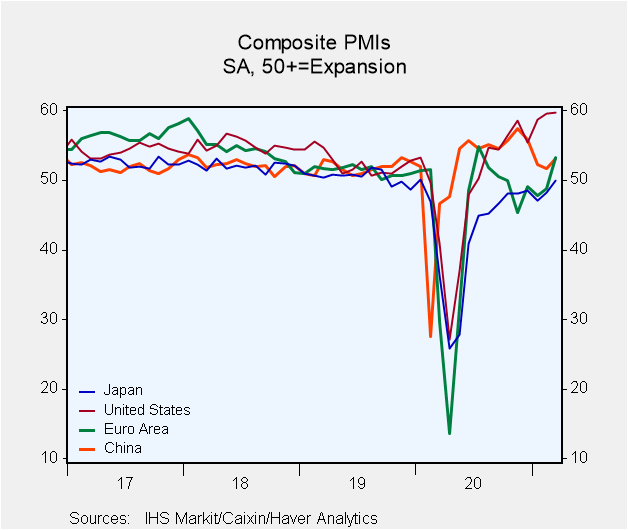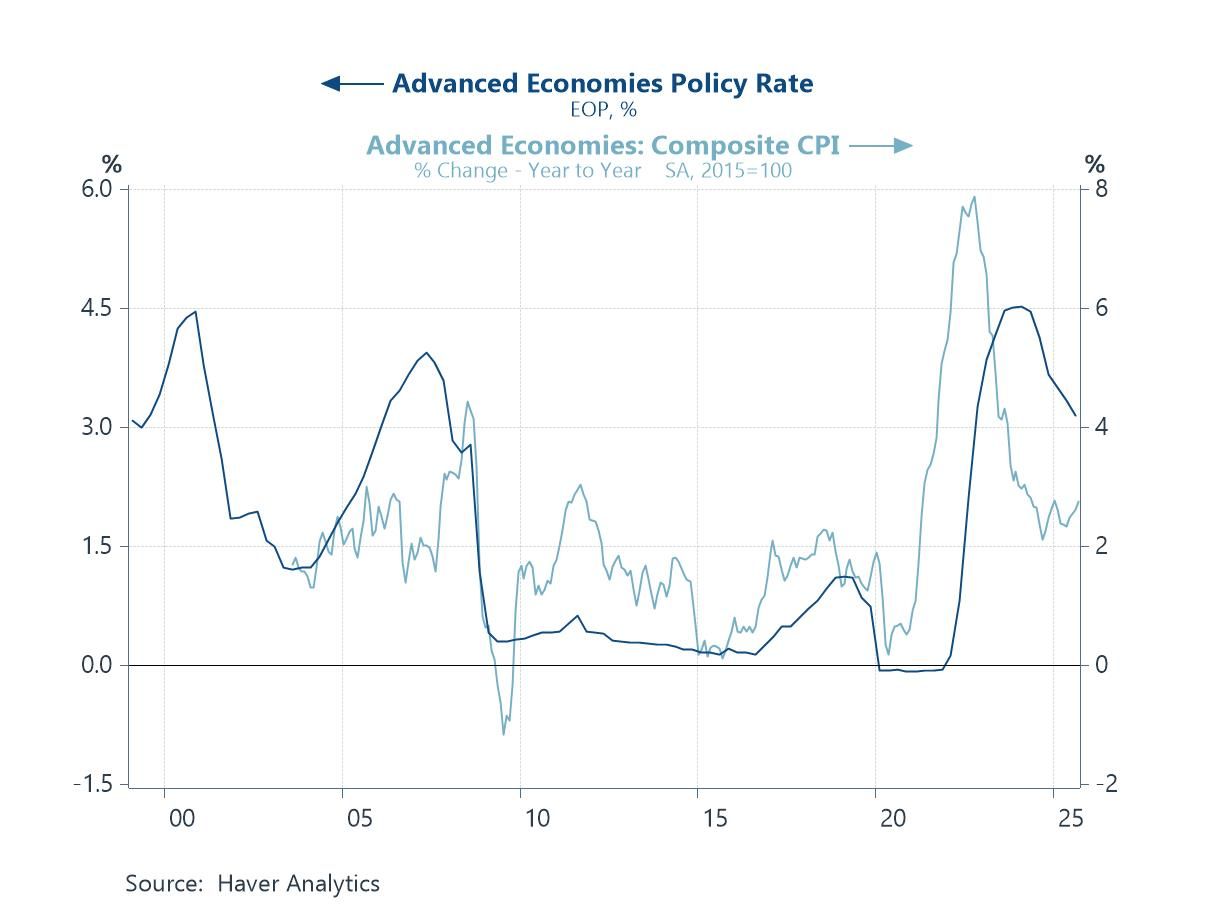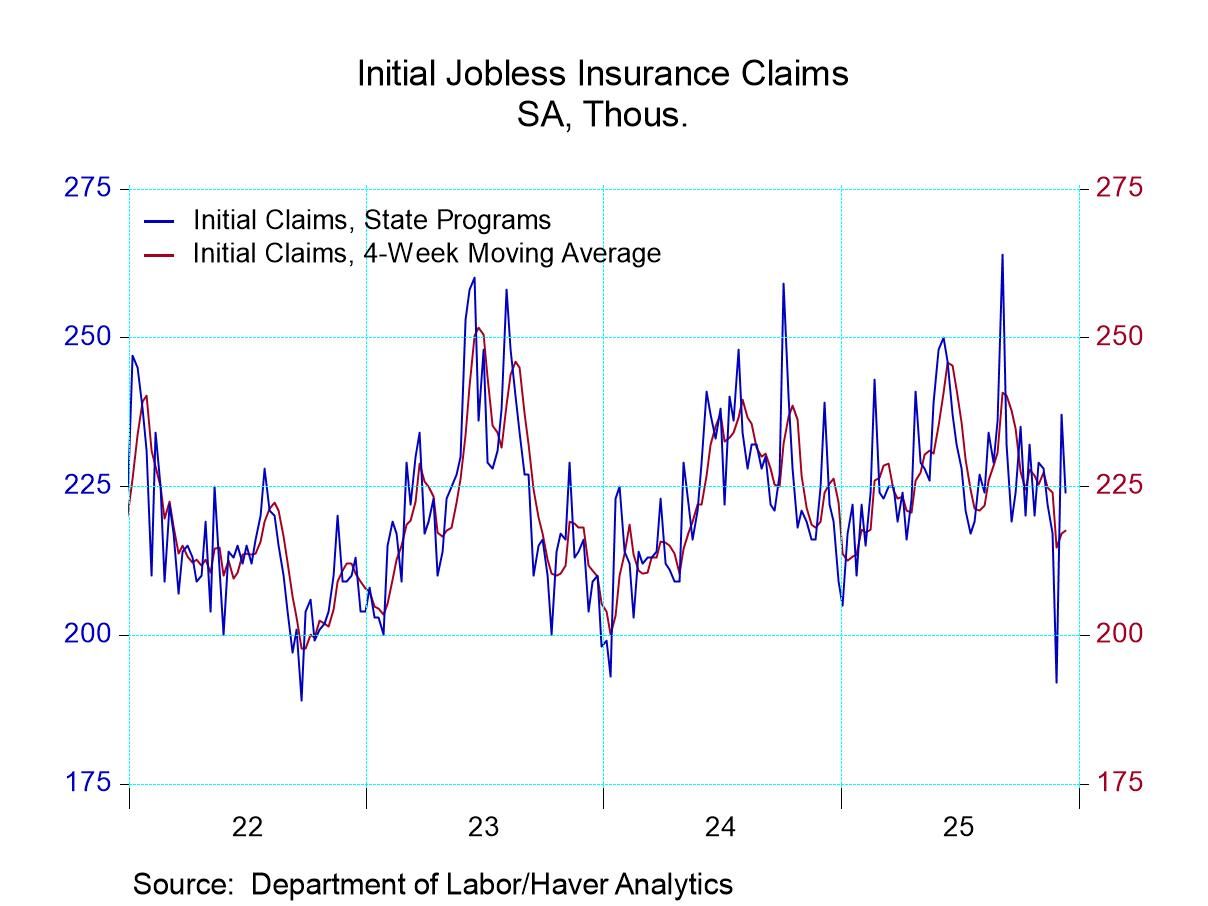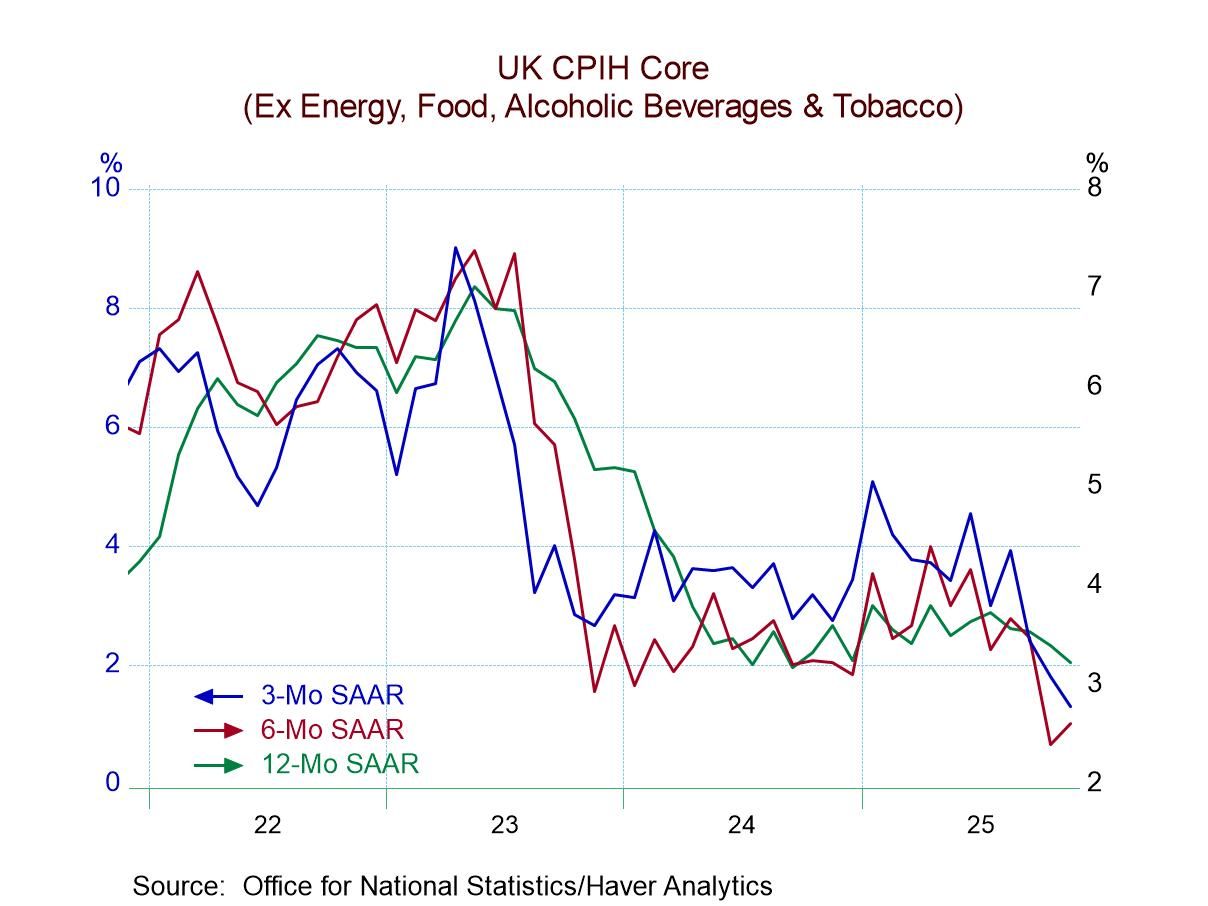 Global| Apr 08 2021
Global| Apr 08 2021Total PMIs Gain Traction in March
Summary
The PMI readings for March show improvement again with the JPMorgan Global reading rising to 54.8 in March from 53.2 in February. While the virus stuck over a year ago battering the global economy, creating a sink hole in growth, and [...]
The PMI readings for March show improvement again with the JPMorgan Global reading rising to 54.8 in March from 53.2 in February. While the virus stuck over a year ago battering the global economy, creating a sink hole in growth, and prompting a recovery of unprecedented speed and magnitude, the ongoing recovery is still incomplete and continues to exhibit stop-go characteristics as the ongoing and erratic spread of the virus continues to get in the way of a return to business and life ‘as usual’ on a global scale. The March gain in the JPMorgan global competitive PMI reading has only risen for two consecutive months. The ongoing nature of the recovery has been much stronger and more consistent for the manufacturing sector, whereas the services sector continues to show halting progress or stop-go behavior.
 Of the four jurisdictions listed in the graph, the U.S. has the strongest current profile having launched a series of massive support programs for its economy. The U.S. Markit gauge shows what appears to be a nearly ‘complete recovery’ achieved in August 2020 at a composite headline of 54.6 as part of its rapid recovery. But after the composite PMI moved further ahead, up to 58.6 in November, it fell and waffled and now sits at its highest recovery point to date in March at a value of 59.7. U.S. employment levels strong as job growth has been still lie well below pre-epidemic levels.
Of the four jurisdictions listed in the graph, the U.S. has the strongest current profile having launched a series of massive support programs for its economy. The U.S. Markit gauge shows what appears to be a nearly ‘complete recovery’ achieved in August 2020 at a composite headline of 54.6 as part of its rapid recovery. But after the composite PMI moved further ahead, up to 58.6 in November, it fell and waffled and now sits at its highest recovery point to date in March at a value of 59.7. U.S. employment levels strong as job growth has been still lie well below pre-epidemic levels.
While most other countries have not reached the pinnacles of PMI value exhibited by the U.S. (only Sweden has a higher diffusion score in March), the graph shows a substantial common profile for the four countries or regions plotted there. The relatively poorer performance in the EMU area is from its struggles to obtain enough vaccine in a timely fashion. As a result, it continues to have waves of virus spreading that have been broad in reach. While the EU has been responsible for the procurement and disbursement of vaccine in its area, the local governments have set the policies concerning lockdowns and virus management creating a patchwork of responses in Europe.
The HSBC emerging market index shows a gain for March to 52.6. This also is the second monthly gain in a row for this amalgamation of countries. The JPMorgen Global index reaches a 98.1 percentile queue standing (PQS) in March higher than the 78.8 PQS for emerging markets. The developed countries’ standing checks in at a PQS of 98.1 as well in March. These standings position the current index in data back to December 2016. Of the individual countries and various groups presented in the table (a full count of 26), six have standings in the 90th percentile or higher. But there are still 10 countries as of March with PQS ratings below 50% which leaves them below their respective historic medians for the period. Brazil is exceptionally weak with a PQS in its lower ten percentile region. Brazil is having a real struggle with the virus.
Looking at monthly PMI diffusion raw-scores the last three months have shown only 5 to 8 of the 26 entries in the table with scores below 50 and the number worsening month-to-month has ranged from a high of 13 in January to a low of 8 in March. The six- and three-month averages both show a steady count of period averages below a diffusion reading of ‘50’ at ten while the count of the number of entities slowing is zero over six months rising to ten over three months. Those comparison counts show the impact of the last six-months in being far superior to the year’s average and the also the waffling of the last three- months compared to six-months.
Clearly...recovery progresses. Clearly…recovery is incomplete. Momentum, clearly, is still upward, but the places facing difficulties are now beginning to emerge. The vaccines seem to shine a light at the end of the tunnel. But epidemiologists are cautious (as ever!) warning about the emergence and danger from virus-variants and the potential for new variants to develop particularly in any location where vaccinations lag. There is no denying that in that respect we are all in the same boat because – expert or not- we have all seen how hard it is to contain this thing once it spreads. No one wants a new variant to emerge and to have to start all this all over again. As long as the virus is spreading somewhere, it is roaming free and able to create new variants that may or may not become more contagious or more lethal or take a turn that could make the existing vaccines less effective, or in a worst case, nullify their potency. The sense of relief across the global economy is clear, but it is still more like the endgame in chess match where the upper hand could be lost. The world is now playing this endgame from a position of strength, but it will have to be managed with diligence. Challenges remain; some places have more severe remaining challenges than others.
Robert Brusca
AuthorMore in Author Profile »Robert A. Brusca is Chief Economist of Fact and Opinion Economics, a consulting firm he founded in Manhattan. He has been an economist on Wall Street for over 25 years. He has visited central banking and large institutional clients in over 30 countries in his career as an economist. Mr. Brusca was a Divisional Research Chief at the Federal Reserve Bank of NY (Chief of the International Financial markets Division), a Fed Watcher at Irving Trust and Chief Economist at Nikko Securities International. He is widely quoted and appears in various media. Mr. Brusca holds an MA and Ph.D. in economics from Michigan State University and a BA in Economics from the University of Michigan. His research pursues his strong interests in non aligned policy economics as well as international economics. FAO Economics’ research targets investors to assist them in making better investment decisions in stocks, bonds and in a variety of international assets. The company does not manage money and has no conflicts in giving economic advice.






